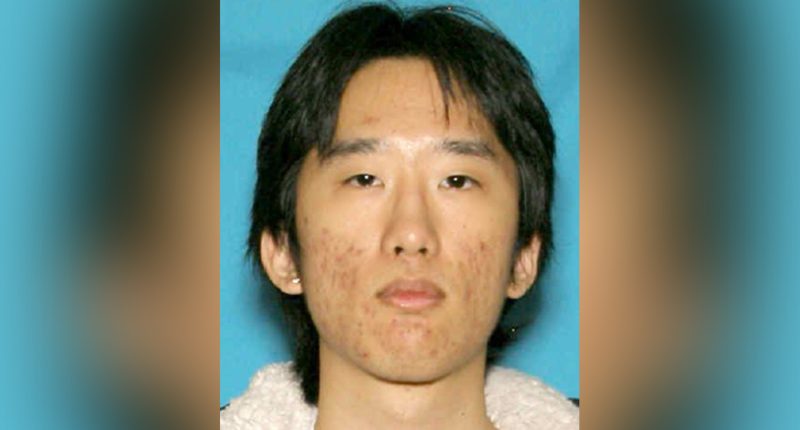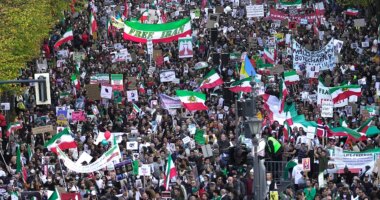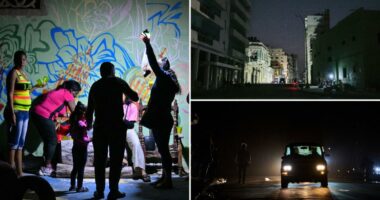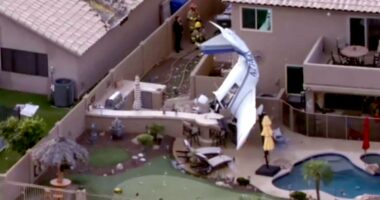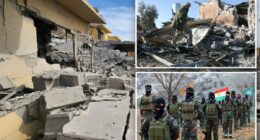Share this @internewscast.com
PALM SPRINGS, Calif. (KABC) — A man from Washington state, accused of supplying large quantities of chemicals used in last month’s bombing of a fertility clinic in Palm Springs, has passed away while in federal custody, confirmed the U. S. Department of Justice.
Daniel Park, aged 32, was detained this month at John F. Kennedy Airport in New York after being deported from Poland, where he had traveled four days following the bombing, according to U.S. Attorney Bill Essayli. He was facing charges of conspiracy.
The U. S. Department of Justice Federal Bureau of Prisons stated that Park was discovered unresponsive at around 7:30 a.m. on Tuesday at the Metropolitan Detention Center in Los Angeles.
“Responding employees initiated life-saving measures. Emergency medical services (EMS) were requested while life-saving efforts continued,” the statement said. “Mr. Park was transported by EMS to a local hospital and subsequently pronounced deceased by hospital personnel.”
Further details about the manner in which Park died were not immediately shared.
No employees or other incarcerated individuals were injured, and at no time was the public in danger, the statement said.
Federal authorities allege Park shipped 180 pounds of ammonium nitrate to Guy Edward Bartkus, 25, who bombed the clinic and was killed in the blast. The chemical compound is an explosive precursor that can be used to make homemade bombs, Essayli said.
Park allegedly also spent two weeks visiting Bartkus in late January and February, conducting experiments in bomb-making.
The suspect’s father, Richard Bartkus, told the New York Times he and his son were estranged. He said as a teen, his son would make smoke bombs.
Park and Bartkus met in online forums dedicated to the anti-natalist movement, bonding over a “shared belief that people shouldn’t exist,” said Akil Davis, the FBI’s assistant director in charge.
Anti-natalism is a fringe theory that opposes childbirth and population growth and believes people should not continue to procreate. Officials said Bartkus intentionally targeted the fertility clinic as an act of terrorism. He tried to livestream the explosion, but the attempt failed, the FBI says.
The blast gutted the American Reproductive Centers fertility clinic in Palm Springs and shattered the windows of nearby buildings along a palm tree-lined street. Witnesses described a loud boom followed by a chaotic scene, with people screaming in terror and glass strewn along the sidewalk and street. Remains later identified as Bartkus were found near a charred vehicle outside the clinic.
Investigators haven’t said if Bartkus intended to kill himself in the attack or why he chose the specific facility. The clinic provides services to help people get pregnant, including in vitro fertilization and fertility evaluations.
Authorities executed a search warrant at Park’s residence in Seattle and found “an explosive recipe that was similar to the Oklahoma City bombing,” Davis said.
Scott Sweetow, a retired ATF explosives expert, had previously said the amount of damage caused indicated that the suspect used a “high explosive” similar to dynamite and TNT rather than a “low explosive” like gun powder.
Those types of explosives are normally difficult for civilians to access, but increasingly people are finding ways to concoct explosives at home, he said.
“Once you know the chemistry involved, it’s pretty easy to get stuff,” Sweetow said. “The ingredients you could get at a grocery store.”
Davis previously called the explosion possibly the “largest bombing scene that we’ve had in Southern California.”
Associated Press contributed to this report.
Copyright © 2025 KABC Television, LLC. All rights reserved.
